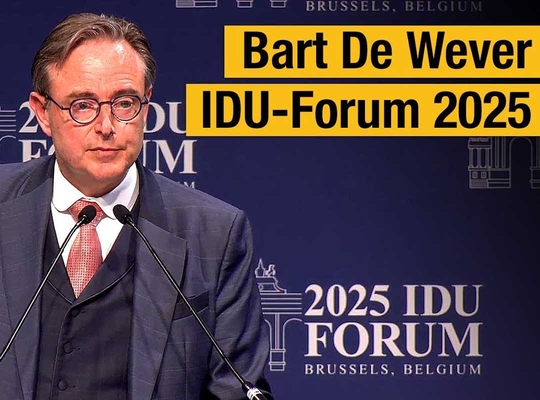You are here
Bart De Wever addresses the International Democracy Union: “Conservatism doesn’t stand still. It evolves—always, but gradually.”

Belgian Prime Minister Bart De Wever delivered a powerful speech at the International Democracy Union (IDU)—a global alliance of centre-right parties—calling for a renewed embrace of Enlightenment values. Not as a nostalgic return to the past, but as a redefinition of Conservatism The general meaning of conservatism is that it is a belief in the utilisation of established and traditional practices or, if necessary, is only willing to change slowly or gradually. The more specific, political meaning is that it represents a critical position in contrast to the idea that humans and society are perfectly achievable, such as these are in ideologies like liberalism and socialism. The N-VA also equates conservatism with a sense of community: we don’t see the individual or the state, but rather the community, to be the most important piece. conservatism as a force for progress.
Victimhood culture, postmodern relativism, and Western self-loathing
Addressing a room of centre-right leaders from around the world, Bart De Wever offered a sharp analysis: “The progressive movement has betrayed the ideals of the Enlightenment. We conservatives are the only ones who still take them seriously.”
He referred to The Betrayal of the Enlightenment by philosopher Maarten Boudry, who argues that the political left has turned its back on the principles of progress, science, and universal values. In their place, he sees a culture of victimhood, postmodern relativism, and a deep-rooted self-hatred of the West.
De Wever agreed with this diagnosis but went a step further: “The progressive high-speed train has run off the rails. It doesn’t stop, it races ahead toward an unknown destination. The only thing its passengers know for sure is that we haven’t arrived yet. Conservatives also want to move forward—but we prefer the slower train. We take time to enjoy the view, step off occasionally to explore the surroundings, and check who’s still on board and where we’re actually headed.”
Rereading—and challenging—Hayek
De Wever also entered into dialogue with classic liberal thinkers, citing Friedrich Hayek’s criticism that conservatives fear change. “But is that still true?” he asked aloud.
His answer: “We want to preserve what is valuable. That’s why we embrace change—provided it’s thoughtful and respectful.”
To underscore his point, he quoted Benjamin Disraeli and Emperor Augustus: change must never break with tradition but should build upon it.
In doing so, Bart De Wever positioned enlightened conservatism as the only meaningful answer to the challenges of our time: “It’s in our DNA to safeguard what works while remaining open to what can be improved.”
The future belongs to enlightened conservatism
He closed with a confident call to action: “The future belongs to those who can pair freedom, justice, and democracy with solidarity and a sense of community. If we succeed, the future of conservatism will outshine its past.”
With these words, Bart De Wever offered not only direction to the IDU congress, but also a guiding vision for modern conservatism in Flanders, Europe, and beyond.

